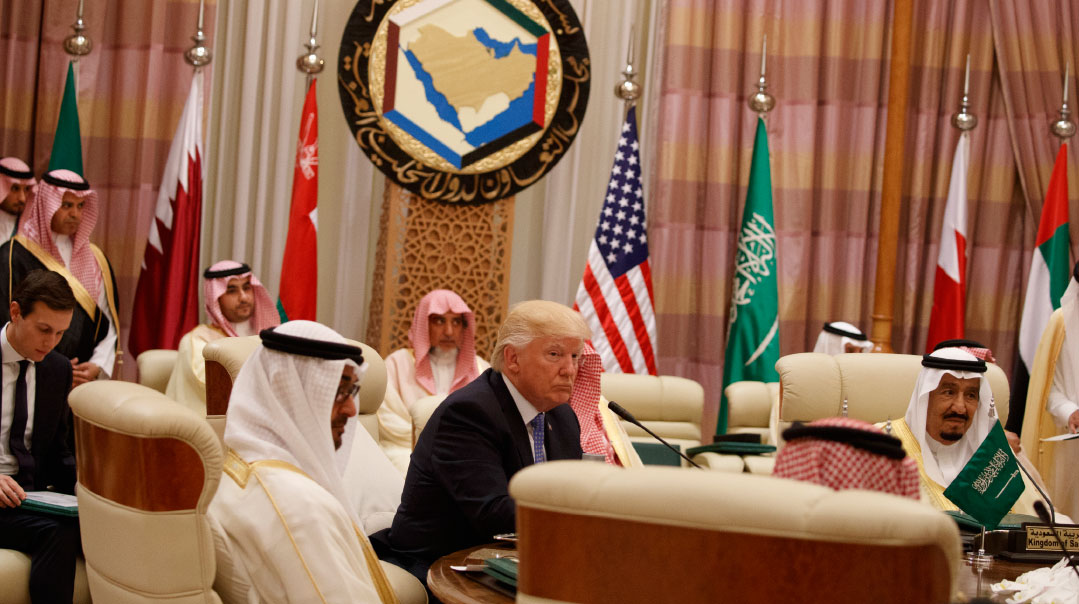The Real Peace is with the Arab States

While the United States can withdraw from the Middle East, Israel cannot

The Trump administration’s peace plan, released last week, is theoretically in the public domain: Jared Kushner is making the rounds in the media, various facilitators are arguing that the Palestinians should return to the negotiating table, and the Arab League, predictably, summarily rejected the plan. In short, the plan that was three years in the making is finally a reality.
But in truth, the real action is behind the scenes, where Washington is attempting to maintain a sensitive balance between Israel and the Arab states while lobbying energetically to achieve normalization between the two parties. That’s the context in which to understand the cancellation of Israel’s annexation of the settlements, as well as Prime Minister Binyamin Netanyahu’s visit to Uganda this week.
The White House is moving to improve Israeli-Arab relations on three fronts: nonaggression pacts, direct flights between Israel and Arab countries, and official participation of Israeli representatives at Arab summits and events, according to sources in the White House.
What happened last week at the White House was dramatic: An American president offered the Palestinians much less than his predecessors — a state in 70 percent of the West Bank, and a symbolic capital in East Jerusalem — and the reactions in most Arab capitals ranged between silence to outright approval. That tells you something about the positive relationship between the Trump administration and the Arab world, between the Arab world and Israel, and between Israel and the White House.
I spoke to David Makovsky, director of the Project on Arab-Israel Relations at the Washington Institute, to discuss the details of the plan, and whether it has any chance of success.
“One thing that’s undeniable is the administration has succeeded in getting the Arab states to come out with positions that are very much at odds with the Palestinians,” said Makovsky, who is well acquainted with previous negotiation attempts. “And this is virtually unprecedented. The question is, will this be sustainable over time, or is this short lived?”
Remaining sensitive to the concerns of Arab states was on the public agenda just last week, when US ambassador to Israel David Friedman hurried to tell reporters that Israel could annex the settlements without delay, while White House aide Jared Kushner insisted Israel should wait. Kushner’s stance is closely connected with the White House’s efforts on the Arab front.
The White House believes the time has come for the secret connections between Israel and the Arab states to bud into the open, and fears that immediate annexation of the settlements could set things back. Makovsky views the situation similarly.
“I am concerned that the calls for immediate annexation will have the effect of driving these Arab states right back in the hands of Mahmoud Abbas,” Makovsky said. “Apart from the annexation issue, I do think we should give this approach some time. I think with the coming Israeli elections, we don’t know [who will hold power] in Israel and how they’re going to look at this. I think the most urgent thing is to avoid annexation now, because it will also fuel those critics who say this is more of an annexation plan than a peace plan.”
On that point, Makovsky says even if the timing of the release wasn’t coincidental, it shouldn’t detract from the thought and effort the White House put into crafting the proposal.
“The timing of the release is clearly linked to the Israeli elections,” he said. “To be fair to the administration, I think these are ideas and texts they’ve been working on for three years. And I think it’s important to separate out the timing of the release from the content of the plan itself.”
The key question is: Why did the Arabs reverse their approach to the conflict? According to Makovsky, the Palestinians no longer enjoy the undivided attention and sympathy of the Arab world. But that doesn’t mean Israel can do whatever it wants without encountering a cold response.
“I think what’s changed is the Arab governments define their priorities more regionally than just merely refracting them through the prism of their relations with the Palestinians,” he told Mishpacha in an interview in his office. However, he added, “This is not an open check. I’m sure if there were an annexation of the Jordan Valley, this fragile move [of supporting the plan] could backfire. But what’s interesting to me is that some of these countries look at Israel more as an opportunity than as a threat.”
Makovsky also thinks the Arab states are treading carefully with President Trump. “They believe [he] is a unique figure who cannot withstand any criticism,” he said. “The minute they criticize him, he will blast them on Twitter.”
The forces that are bringing Israel and the Arab states together are real and permanent, however. After all, while the United States can withdraw from the Middle East, Israel cannot. “The calculus is different from what it once was,” Makovsky said.
(Originally featured in Mishpacha, Issue 797)
Oops! We could not locate your form.













